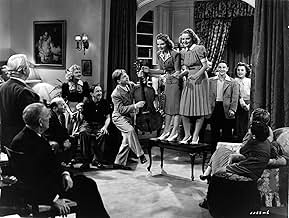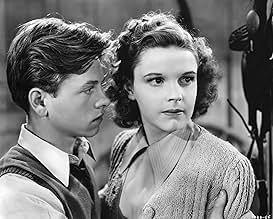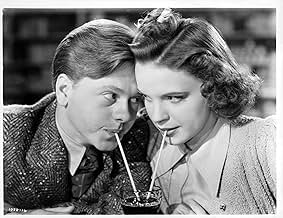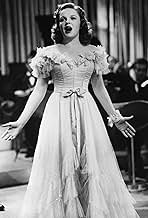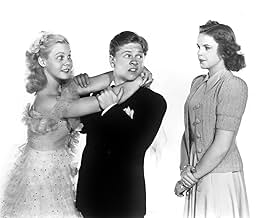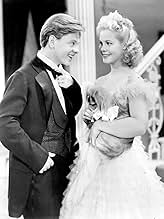Ajouter une intrigue dans votre langueA group of vaudevillians struggling to compete with talkies hits the road hoping for a comeback. Frustrated to be left behind, all of their kids put on a show themselves to raise money for t... Tout lireA group of vaudevillians struggling to compete with talkies hits the road hoping for a comeback. Frustrated to be left behind, all of their kids put on a show themselves to raise money for the families and to prove they've got talent, too.A group of vaudevillians struggling to compete with talkies hits the road hoping for a comeback. Frustrated to be left behind, all of their kids put on a show themselves to raise money for the families and to prove they've got talent, too.
- Nommé pour 2 oscars
- 2 victoires et 2 nominations au total
- Bobs
- (as John Sheffield)
Avis en vedette
Most of the songs are nice but none wowed me. Several classic Rodgers & Hart tunes from the Broadway musical this was based on are either omitted altogether or featured too briefly to make an impact. An ear-splitting operatic version of "You're My Lucky Star" by Betty Jaynes is probably the worst song in the movie. Judy's "I Cried for You" is best. Salute to minstrel shows with cast members in blackface will upset some so prepare yourself if you're one of them. Directed by Busby Berkeley, as evidenced by his distinct touches on the "God's Country" closing number. Speaking of which, that number has Mickey & Judy satirizing FDR & Eleanor. After FDR's death this part was cut out of future showings and it remained that way until the '90s. It's a lively number and the added historical value is a plus. Good old-fashioned fun. Charming, innocent, and yes, a little corny, but an enjoyable movie overall.
What he and Judy do, they do better than anyone else, put on a show. In fact in this case the 'put on a show' gambit did originate in the original Broadway Musical. Babes in Arms was one of Richard Rodgers and Lorenz Hart's best shows it ran for 289 performances in the 1937 season and boasted such Rodgers&Hart classics as Johnny One Note, Way Out West, My Funny Valentine, I Wish I Were in Love Again all of which were discarded for the film. The Lady is a Tramp is only heard instrumentally, my guess is the Code frowned on that lyric. The title song and Where or When are retained. In fact when you come right down to it, only the basic idea the songs mentioned and a couple characters names came over from Broadway.
Still Nacio Herb Brown and Arthur Freed wrote Good Morning which is better known from Singin' in the Rain, but it was Judy and Mickey who introduced it here. And a whole lot of other Brown&Freed songs from MGM musicals got interpolated into the score.
Douglas MacPhail and Betty Jaynes who were introduced in Sweethearts also are here and sing beautifully. They married, but the marriage and MacPhail's career fell apart and he committed suicide a few years later. He had a great baritone voice, what a shame. The following year he introduced my favorite Cole Porter song, I Concentrate On You in The Broadway Melody of 1940.
This was the film Judy Garland did right after The Wizard of Oz and coming along right with her is Margaret Hamilton playing another Miss Gulch like character. One of those spinster ladies who forever pry into other people's business.
Believe it or not there was still a lot of prejudice against theatrical people even in 1937. A lot of old vaudeville types like Charles Winninger, Rooney's father in the film, settle in the town of Seaport on Long Island and their presence apparently upsets the ruling families like Hamilton's. When times go bad and vaudeville goes to seed, things get kind of rough for them. The old timers try to take a last tour to raise some money, but instead it's the kids who are up to the latest trends in pop music who save the day.
Guy Kibbee is in this also, playing against type as a wise and sympathetic judge, usually the parts MGM reserved for Lewis Stone or Lionel Barrymore. A more typical Kibbee type would be the oafish tycoon in 42nd Street, but he's fine here.
Possibly director Busby Berkeley wanted Kibbee, maybe as a good luck charm from that other breakthrough musical of his from his days at Warner Brothers. Of course the musical numbers in the show are set with the usual Berkeley surrealism, a little tempered though from his high flying days at Warner Brothers. That same year Berkeley had done a surreal type number in the Jeanette MacDonald-Lew Ayres film Broadway Serenade and it laid an egg. Someone at MGM must have reined him in.
Babes In Arms retains all its charms from 1939 mainly because Mickey Rooney is infectious and Judy Garland's singing is eternal.
Though, one cannot approach a film like this with more than a hint of cynicism: Busby Berkeley is arguably the greatest choreographer in the history of film, and though he does not show off the spectacle of his earlier films, like Gold Diggers of 1933 and Gold Diggers of 1935 (which he did not direct), his dance numbers are interesting (for instance, when the town's teenagers partake in a book-burning, throwing into the flames symbols of conformity). The film is sweet, fresh, and bright, and, as the first Arthur Freed musical, serves as one of his better (though certainly not his best).
In all, I give it a 3 out of 4 stars (***).
On a side note, three of the songs that appear in Singing in the Rain appear in this film, predating the Gene Kelly musical by over 15 years: Good Morning, Good Morning, Singing in the Rain (which appears in a montage showing previous MGM musicals), and You Are My Lucky Star.
"Babes in Arms" was a Broadway musical by Lorenz Hart and Richard Rodgers. Like most of those movies of that time, the creative people in the studio took liberties, incorporating material that was not in the original theater work. Busby Berkeley, the genius of those musical films, was at the helm. It's easy to see his imprint all over the movie in the way he stages the big musical numbers and move his players to get a maximum result out of them.
Mickey Rooney and Judy Garland were two young actors at the time that were good in whatever they did together. The pair showed an amazing amount of charisma in their musical numbers as well as in the over all chemistry in all their scenes together. Mickey Rooney plays the earnest Mickey Moran, the son of vaudevillians, who wants to make a name for himself. Judy Garland is Patsy Barton, a girl-next-door type that is sweet, wise and patient, even when Mickey is dazzled by the film star that wants to back their show in order to have the lead in it.
The other players are excellent, which is not saying much, as MGM and the other studios were blessed with solid talent that went from film to film doing amazing work in whatever picture they appeared. Charles Winninger, Guy Kibee, Betty Jaynes, Douglas McPhail, and the wonderful Margaret Hamilton appear in supporting roles.
Enjoy the infectious actors of this movie and the Rodgers and Hart music, as well as the other songs that were added to it. Busby Berkeley did a marvelous job with the film that shows a less stressful time in the country.
Le saviez-vous
- AnecdotesMGM Studio's biggest money grosser of 1939, surpassing Le magicien d'Oz (1939) for that production year.
- GaffesDuring the girls' duet, Patsy Barton begins her solo, and Mickey Moran switches from cello plucking to piano thumping. However, the music continues as it was before, and we don't hear any amazing sounds on the piano in spite of Mickey's efforts.
- Citations
Rosalie Essex: How much do you need?
Mickey Moran: Well, let me see. First of all, we're going to use a barn that some actors used last summer and turned it into an outdoor theater. I figured if we all pitched in together - that is, for the scenery and the costumes and everything - it would run us about $287.
Rosalie Essex: Have you got it yet?
Mickey Moran: No.
Rosalie Essex: Well, you have now.
- Autres versionsOlder TV prints (and early video releases) of "Babes In Arms" run 91 minutes, and exclude the "My Day" segment of the finale, with Mickey Rooney and Judy Garland spoofing Franklin and Eleanor Roosevelt. This segment was deleted for a 1948 reissue. "My Day" was restored in the 1990's by Ted Turner, and is included in current prints.
- ConnexionsEdited into Hollywood: The Dream Factory (1972)
- Bandes originalesBabes in Arms
(1937)
Music by Richard Rodgers
Lyrics by Lorenz Hart
Played during the opening credits
Sung by Douglas McPhail (uncredited), Mickey Rooney (uncredited), Judy Garland (uncredited) and chorus
Meilleurs choix
- How long is Babes in Arms?Propulsé par Alexa
Détails
Box-office
- Budget
- 748 000 $ US (estimation)
- Durée1 heure 34 minutes
- Couleur
- Rapport de forme
- 1.37 : 1


